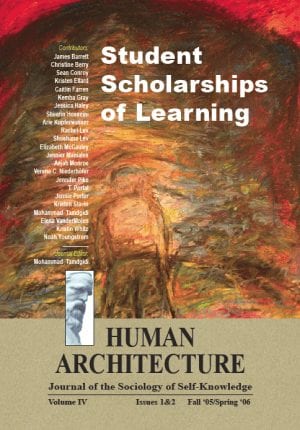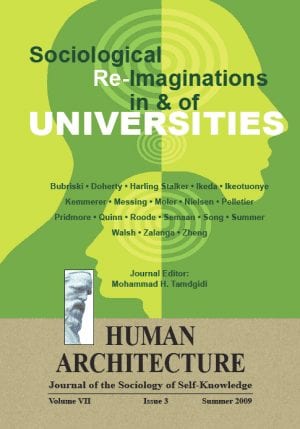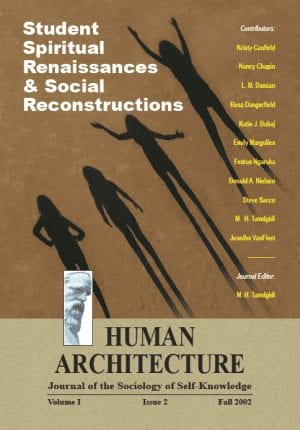Journal Article — Intersecting Autobiography, History, and Theory: The Subtler Global Violences of Colonialism and Racism in Fanon, Said, and Anzaldúa — by Mohammad H. Tamdgidi
$15.00
How were Frantz Fanon, Edward Said, and Gloria Anzaldúa personally troubled–in their respective regional (Martiniquan/African, Palestinian/Arab, and Chicana/Mexican) historical contexts–by the global violences of colonialism and racism, and how did such personal experiences motivate and explain (and how were they in turn informed by) their highly visible public intellectual discourses and actions?
Description
Abstract
How were Frantz Fanon, Edward Said, and Gloria Anzaldúa personally troubled–in their respective regional (Martiniquan/African, Palestinian/Arab, and Chicana/Mexican) historical contexts–by the global violences of colonialism and racism, and how did such personal experiences motivate and explain (and how were they in turn informed by) their highly visible public intellectual discourses and actions? In this article, I comparatively explore the sociological imaginations of colonialism and racism as found in the writings of Fanon, Said, and Anzaldúa, seeking to identify the theoretical implications such a study may have for advancing human emancipatory discourses and practices.
Fanon’s ideas and activism have often been associated with an advocacy for physical and cruder forms of revolutionary response to the violence brought on by colonialism and racism. Revisiting such misinterpretations of Fanon’s work in conversation with Said’s and Anzaldúa’s writings, I argue that the differing (respectively embracing, ambiguous, and rejective) responses of the three intellectuals regarding revolutionary physical violence is reflective of the regional historical conditions of colonialism and racism confronting each intellectual. I argue, further, that what commonly motivated the highly visible and committed public discourses and struggles of these three public intellectuals were their sensitivity to deeply troubling and much subtler personal experiences of racism and colonialism each had endured in their lives, involving becoming aware of and experiencing an alienated/ing multiply-selved landscape within that accommodated both the victimhood and the perpetration of racial and colonial identities and practices in oneself. It is one thing to witness and be a victim of racial prejudice and colonial oppression in and by others, and another to realize that one and one’s loved ones have been turned into perpetrators of or accomplices in the same, at times against oneself.
The study points to what I have previously proposed (2004-7) as a need to move beyond Newtonian and toward quantal sociological imaginations whereby the atomic “individual” units of sociological analysis and practice are problematized and transcended in favor of recognizing the strange, sub-atomic and quantal, realities of personal and broader social lives in terms of relationalities of intra/inter/extrapersonal selfhoods. Such exercises in the sociology of self-knowledge may more effectively accommodate the subtler realization that one may be at the same time not only an oppressor and an oppressed vis-á-vis others, but also an oppressor of oneself–an awakening that is indispensable for pursuing what Fanon called the “total liberation” of humanity.
Recommended Citation
Tamdgidi, Mohammad H. 2007. “Intersecting Autobiography, History, and Theory: The Subtler Global Violences of Colonialism and Racism in Fanon, Said, and Anzaldúa.” Pp. 113-136 in Reflections on Fanon: The Violences of Colonialism and Racism, Inner and Global—Conversations with Frantz Fanon on the Meaning of Human Emancipation (Human Architecture: Journal of the Sociology of Self-Knowledge: Volume V, Special Issue, 2007.) Belmont, MA: Okcir Press (an imprint of Ahead Publishing House).
The various editions of Reflections on Fanon: The Violences of Colonialism and Racism, Inner and Global—Conversations with Frantz Fanon on the Meaning of Human Emancipation can be ordered from the Okcir Store and are also available for ordering from all major online bookstores worldwide (such as Amazon, Barnes&Noble, and others).
Read the Above Publication Online
To read the above publication online, you need to be logged in as an OKCIR Library member with a valid access. In that case just click on the large PDF icon below to access the publication. Make sure you refresh your browser page after logging in.








